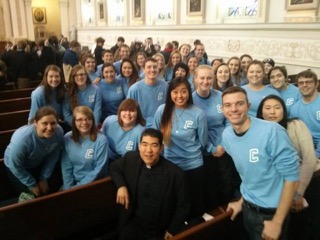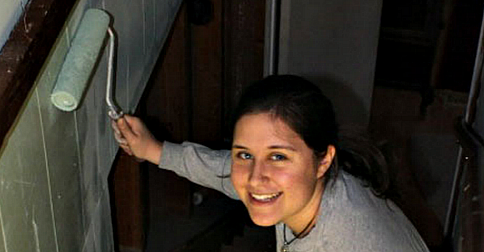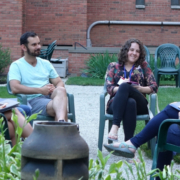Marching On
 As we marched up the sunlit street in the chilly January air, there was a kind of hollow feeling in my stomach, not a bad feeling, but a feeling of incompleteness. That I was joining thousands of people to march for something I felt passionate about and wanted to stand up for was an incredible feeling, and feat, in and of itself. But there was something missing.
As we marched up the sunlit street in the chilly January air, there was a kind of hollow feeling in my stomach, not a bad feeling, but a feeling of incompleteness. That I was joining thousands of people to march for something I felt passionate about and wanted to stand up for was an incredible feeling, and feat, in and of itself. But there was something missing.
***
About a month ago I attended the National March for Life in Washington, D.C., for the first time. I was in a group of thirty-five other Creighton students among thousands of others—young and old, Catholics, Protestants and non-religious, conservatives and liberals—who were braving the cold to participate in one of the largest and most controversial public witnesses of our time.
I was thrilled to be there. I was surrounded by my friends and peers, walking for something I strongly believed in: the dignity of human life.
As excited as I was to be at the march, I felt like something was missing from the experience. I fully blame this reaction on attending a Jesuit university.
***
Pro-life, I’ve learned, is a controversial phrase, among everyone, no matter what side of the issue you are on. Some people don’t agree with the pro-life sentiment at all, and others—other pro-lifers—disagree with its scope. I will openly admit that I am pro-life, but not in the traditional, rather limited, sense of the phrase.
To me, being pro-life doesn’t just mean opposing abortion. It doesn’t stop when the baby is born. Rather, I believe that if being pro-life is about promoting and defending the dignity of human life, then this reaches across the spectrum of life itself. It starts with recognizing the humanity of the baby in the womb, yes, but it goes on to care about that baby’s life, its education and healthcare, its opportunities for fair labor and a just wage, its right to be treated humanely if it commits a crime, its right to die a natural death. Being pro-life is being pro-person from the cradle to the grave. It means caring about all the issues that threaten people’s dignity throughout their entire lives, not just while in the womb.
This is not the usual way of talking about or promoting the pro-life sentiment. Many pro-lifers I’ve met actually get upset when it’s suggested that we expand our use and advocacy of the term. I have to admit that until working in the Creighton Center for Service and Justice and taking part in advocacy for other social justice issues (i.e. education, healthcare, immigration reform, sustainability, opposing the death-penalty), my own understanding of what it meant to be pro-life was pretty narrow. A pro-life stance focused solely on abortion isn’t bad, but, in my opinion, it’s missing something.
It wasn’t until I invested myself in those other social justice issues that my understanding of pro-life broadened. It became clear to me, at some point, that if I really care about the dignity of my brothers and sisters, this means upholding and defending that dignity throughout their entire lives. For me, this doesn’t stop once they are born. Being pro-life is about fighting for the dignity of person’s life throughout their life. I cannot in one circumstance fight for a person’s dignity and then in another circumstance, when their dignity is threatened by some other social injustice, keep quiet about it.
I’ve found, too, that not only does this broadened sense of pro-life make my stance more authentic and consistent, it also promotes more unity across other social justice issues. Being pro-life means I can join my coworkers who are passionate about immigration reform in that area of advocacy, because being treated humanely, even as an immigrant, regardless of whether you cross the border legally or not, is directly tied to a person’s dignity. If you think about it, nearly every issue that deals in some way with a human being’s flourishing can be tied to the pro-life stance. Perhaps this can foster more collaboration and cooperation among those advocating and working for these other issues. I know it has for me, personally.
***
The feeling of not quite being satisfied stuck with me as I marched on. When I stopped to think about it more deeply, I knew where it was coming from. A truth settled in my mind. It didn’t matter that thousands of us were marching for life that day. It didn’t matter what kinds of signs we were holding or what graphic images of aborted children were along the march route. None of this mattered if that’s where our advocacy ended. The truth was that I could march and hold up signs all I wanted, but if I wasn’t continually engaging in conversation about pro-life issues, if I wasn’t reaching out to legislators and encouraging them to pass pro-life laws, what did it matter?
Furthermore, if I’m not actively supporting men and women faced with the difficult choice of abortion, if I’m not engaged in changing the societal systems that lead us to these difficult choices, then why even march? And if being pro-life really is about promoting dignity throughout a person’s entire life, if I don’t work for humane immigration reform, or higher standards of education, or sustainable treatment of the environment, for example, can I really call myself pro-life?
These are questions that, for me, inform my decision to be pro-life and determine what that phrase means. It’s not so much an intellectual concept as it is a personal one: Having met and been in solidarity with people experiencing a number of different social justice issues, I’ve seen how those issues threaten their dignity as people, and I want to fight for that dignity.
 As we finished the march in front of the Supreme Court, I felt good about being there and partaking in it as a public witness, but I left knowing that I would have to keep marching on. Being pro-life, for me, demands that I work to change unjust social structures that threaten the dignity of human life throughout a person’s entire life, it demands that I use my voice to speak out against all social injustices that threaten a person’s flourishing. If my Jesuit education has taught me anything, it’s that being a woman for and with others means being in solidarity with them throughout their entire lives. It means being for and with you from the beginning to the end.
As we finished the march in front of the Supreme Court, I felt good about being there and partaking in it as a public witness, but I left knowing that I would have to keep marching on. Being pro-life, for me, demands that I work to change unjust social structures that threaten the dignity of human life throughout a person’s entire life, it demands that I use my voice to speak out against all social injustices that threaten a person’s flourishing. If my Jesuit education has taught me anything, it’s that being a woman for and with others means being in solidarity with them throughout their entire lives. It means being for and with you from the beginning to the end.

Anna Ferguson is a junior studying theology and journalism at Creighton University. She is originally from Wheaton, IL, which is a suburb just West of Chicago, and, yes, a PROUD Cubs fan! The oldest of six girls, she comes from a lively family who instilled in her a desire to serve the less fortunate and learn as much as she can about the world around her. She came into Creighton with the dream of becoming a big reporter one day, but the Ignatian Family Teach-In for Justice, the service trip she attended, the volunteering she participated in, and her theology class convinced her otherwise throughout her freshman year. She couldn’t ignore her passion for service and love for the Catholic faith, so she tacked on a theology major, and dove deeper into service, social justice, and advocacy through her job in the Creighton Center for Service and Justice. Throughout these experiences, she realized that she wanted to use her writing skills for so much more than a big newspaper job. Today, her dream is to be a kind of missionary-journalist, engaging the world in the “gritty reality” around them (to borrow from Fr. Peter Hans Kolvenbach). (Follow Anna on Twitter @AnnaFeguson832).










Hi,
I found this via a link on Twitter and I really liked it. This is my philosophy of being pro-life as well — though I’ve never had any Jesuit schooling. 😉